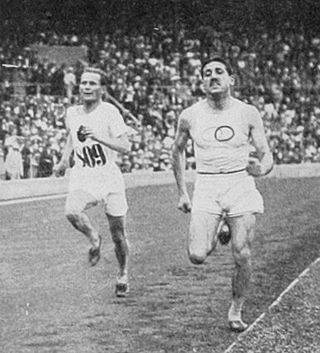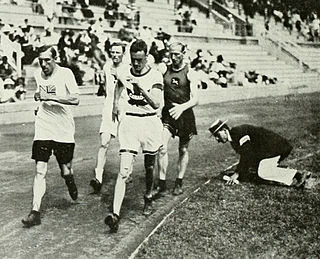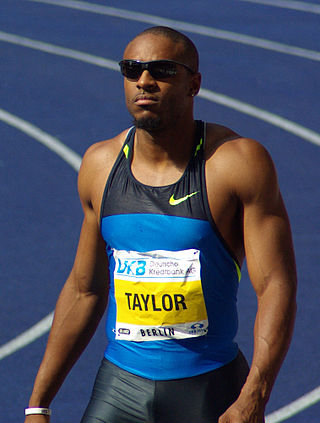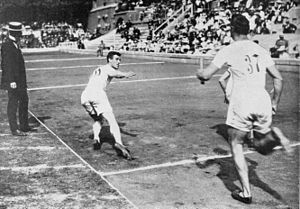
The men's 200 metres was a track and field athletics event held as part of the Athletics at the 1912 Summer Olympics programme. It was the fourth appearance of the event, which has appeared at every edition of the Summer Olympics since the 1900 Summer Olympics. The competition was held on July 10, 1912, and on July 11, 1912. 61 runners from 19 nations competed. NOCs could enter up to 12 athletes. The event was won by Ralph Craig of the United States, the nation's third victory in four Games. Another American, Donald Lippincott, took silver. Great Britain earned its first medal in the 200 metres with Willie Applegarth's bronze.

The men's 400 metres was a track and field athletics event held as part of the Athletics at the 1912 Summer Olympics programme. The competition was held on Friday, July 12, 1912, and on Saturday, July 13, 1912. Forty-nine runners from 16 nations competed. NOCs could enter up to 12 athletes. The event was won by Charles Reidpath of the United States, the nation's fourth title in the event. Hanns Braun of Germany took silver, the nation's first medal in the men's 400 metres.

The men's 800 metres was a track and field athletics event held as part of the athletics at the 1912 Summer Olympics programme. It was the fifth appearance of the event, which is one of 12 athletics events to have been held at every Summer Olympics. The competition was held from Saturday, July 6, 1912, to Monday, July 8, 1912. Forty-seven runners from 16 nations competed. NOCs could enter up to 12 athletes. The event was won by Ted Meredith of the United States, the nation's third consecutive victory in the 800 metres. Mel Sheppard became the first man to win two medals in the event, coming in second to miss out on defending his 1908 gold. Ira Davenport completed the United States sweep, the second time the Americans had swept the 800 metres podium.

The men's 1500 metres was a track and field athletics event held as part of the athletics at the 1912 Summer Olympics programme. The competition was held on Tuesday, July 9, 1912, and on Wednesday, July 10, 1912. Forty-five runners from 14 nations competed, including the Olympic champion from 1908, Mel Sheppard. NOCs could enter up to 12 athletes.

The men's 5000 metres was a track and field athletics event held as part of the Athletics at the 1912 Summer Olympics programme. It was the debut of the event, which along with the 10000 metre event replaced the 5 mile race held at the 1908 Summer Olympics. The competition was held on Tuesday, July 9, 1912, and on Wednesday, July 10, 1912. Thirty-one long-distance runners from eleven nations competed. NOCs could enter up to 12 athletes.

The men's 10,000 metres was a track and field athletics event held as part of the Athletics at the 1912 Summer Olympics programme. It was the debut of the event, which along with the 5000 metres replaced the 5 mile race held at the 1908 Summer Olympics. The competition was held on Sunday, July 7, 1912, and on Monday, July 8, 1912. Thirty runners from 13 nations competed. NOCs could enter up to 12 athletes.

The men's 110 metres hurdles was a track and field athletics event held as part of the Athletics at the 1912 Summer Olympics programme. The competition was held on Thursday, July 11, 1912, and on Friday, July 12, 1912. 22 hurdlers from 10 nations competed. NOCs could enter up to 12 athletes. The event was won by Fred Kelly of the United States, the fifth of five consecutive victories for the nation in the first five Olympic Games. It was also the fourth of four consecutive podium sweeps for the Americans in the event.

The men's 4 × 100 meters relay was a track and field athletics event held as part of the Athletics at the 1912 Summer Olympics program. It was the debut of the event, which along with the 4 × 400-meter relays marked the first relays of equal legs in the athletics program. The competition was held on Monday, July 8, 1912, and on Tuesday, July 9, 1912. NOCs could enter 1 team of 4 athletes, with up to 2 reserves.

The men's 10 kilometres walk was a track and field athletics event held as part of the Athletics at the 1912 Summer Olympics programme. It was the second appearance of racewalking, which had debuted at the previous games with the 10 mile and 3500 metre walks. The 10 kilometre was the only racewalking event in 1912. The competition was held on Monday, July 8, 1912, and on Thursday, July 11, 1912. Twenty-three racewalkers from twelve nations competed. NOCs could enter up to 12 athletes.
The men's 400 metre freestyle was a swimming event held as part of the swimming at the 1912 Summer Olympics programme. It was the third appearance of the event, which had been introduced in 1904. The competition was held from Thursday July 11, 1912 to Sunday July 14, 1912.
The men's 4 × 200 metre freestyle relay was a swimming event held as part of the swimming at the 1912 Summer Olympics programme. It was the second appearance of the event, which had been introduced in 1908. The competition was held on Friday July 12, 1912 and Monday July 15, 1912.
The men's 200 metre breaststroke was a swimming event held as part of the swimming at the 1912 Summer Olympics programme. It was the second appearance of the event, which had been introduced in 1908. Germany swept the medals in the event. The competition was held from Sunday July 7, 1912 to Friday July 12, 1912.
The men's 400 metre breaststroke was a swimming event held as part of the swimming competition at the 1912 Summer Olympics. It was the second appearance of the event, which had been introduced in 1904. The competition was held from Monday July 8, 1912 to Friday July 12, 1912.

The women's 100 metre freestyle was a swimming event held as part of the swimming at the 1912 Summer Olympics programme. It was the first appearance of a women's event in Olympic swimming, followed closely by the 4×100 metre free relay. The competition was held from Monday to Friday, 8 to 12 July 1912.
The men's 400 metres event was part of the track and field athletics programme at the 1920 Summer Olympics. The competition was held on Thursday, August 19, 1920, and on Friday, August 20, 1920. 37 runners from 16 nations competed. No nation had more than 4 runners, suggesting the limit had been reduced from the 12 maximum in force in 1908 and 1912. The event was won by Bevil Rudd of South Africa, the nation's first title in the event. Nils Engdahl's bronze was Sweden's first medal in the 400 metres.

The men's 400 metres hurdles event was part of the track and field athletics programme at the 1920 Summer Olympics. The competition was held on Sunday, August 15, 1920, and on Monday, August 16, 1920. 19 runners from 9 nations competed. Nations were limited to 4 hurdlers each. The event was won by Frank Loomis of the United States, the fourth consecutive victory by an American. The United States secured its second sweep in the event, and first with other nations competing, with John Norton taking silver and August Desch bronze.

The men's 4 × 400 metres relay event was part of the track and field athletics programme at the 1920 Summer Olympics. The competition was held on Sunday, August 22, 1920, and on Monday, August 23, 1920. Twenty-four runners from six nations competed.
The men's 4 × 100 metres relay event was part of the track and field athletics programme at the 1924 Summer Olympics. It was the third appearance of this event. The competition was held on Saturday, July 12, 1924, and on Sunday, July 13, 1924.

The men's 400 metres hurdles event was part of the track and field athletics programme at the 1924 Summer Olympics. The competition was held on Sunday, July 6, 1924, and on Monday, July 7, 1924. Twenty-three hurdlers from 13 nations competed. The maximum number of athletes per nation was 4. The event was won by Morgan Taylor of the United States, the fifth consecutive victory by an American in the event. Erik Wilén received silver, Finland's first medal in the men's 400 metres hurdles. Another American, Ivan Riley, took bronze.

The men's 400 metres hurdles at the 2000 Summer Olympics as part of the athletics programme were held at Stadium Australia on Sunday 24 September, Monday 25 September and Wednesday 27 September 2000. There were 62 competitors from 45 nations. The event was won by 0.03 seconds by Angelo Taylor of the United States, the nation's fifth consecutive and 17th overall victory in the event. Saudi Arabia and South Africa each earned their first medals in the men's 400 metres hurdles, as Hadi Souan Somayli took silver and Llewellyn Herbert received bronze.















